Come From Away
Resenting the Decency in This 9/11 Musical
When Prime Minister Justin Trudeau of Canada traveled to New York City to attend Come From Away, it was already clear that the outpouring of affection for the show wasn’t just because of what was happening on the Broadway stage. Our reaction to any show is no doubt influenced by what we bring into the theatre with us, but once in a while a show owes its collective appeal to the world and the times more than any lyrics or lines.
Written by Irene Sankoff and David Hein, a married couple from Toronto who interviewed hundreds of participants, Come From Away fashions a musical out of the true story of the residents of the small Canadian town of Gander, Newfoundland, who for several days took care of some 7,000 passengers and crew in thirty-eight airplanes that were forced to land at the local airport after the attacks of September 11, 2001.
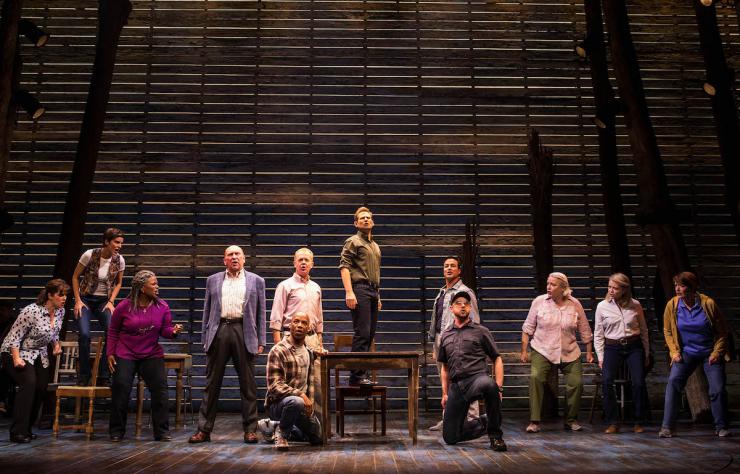
The show relates some of the ways in which the townspeople took to their hosting duties with exceptional hospitality and ingenuity. Having arranged to truck in food from throughout the local region, they did not have the facilities to meet health department requirements of keeping it all refrigerated. So they turned the Gander community center hockey rink into “the world’s largest walk-in refrigerator.”
Before the performance Trudeau attended, he made a brief speech: "The world gets to see what it is to lean on each other and be there for each other through the darkest times."
Under different circumstances, nothing he said would seem especially noteworthy.
But Trudeau makes a point of advocating for refugees and celebrating the arts. This is, of course, in sharp contrast to President Donald Trump. On the very day of Trudeau’s speech in Broadway’s Gerald Schoenfeld Theatre—as it happens, on the Ides of March—Trump released his budget plan. It calls for the elimination of cultural agencies—the National Endowment for the Arts, the National Institutes of Health, the Institute of Museum and Library Services, and the Corporation for Public Broadcasting—as well as of the Emergency Refugee and Migration Assistance Fund.
'Come From Away' allows theatergoers to register their dissent against what’s happening in Washington, at least in their own minds…but I couldn’t help harboring some resentment towards the show and its admirers.
It’s the times we suddenly live in, in other words, that surely have helped turn Come From Away into a respectable hit, one of just five Broadway shows last week with more than 100 percent attendance. (The others are Hamilton, Book of Mormon, Dear Evan Hansen, and Hello, Dolly starring Bette Midler.) Come From Away allows theatregoers to register their dissent against what’s happening in Washington, at least in their own minds. It seems a clear beneficiary of what I had labeled The Trump Effect, in an article I wrote in December to describe how the election had altered my personal perception of the shows I was seeing.
The irony for me is that it wasn’t the Trump Effect that most affected my view of Come From Away.
I was across the street from the Twin Towers on the morning of September 11, 2001 when they were attacked. When an out-of-town friend visiting New York recently bought me a ticket to the 9/11 Memorial Museum, I couldn’t bring myself to go (“Forgetting 9/11”).
When I saw Come From Away, I was grateful that the musical didn’t wind up being “triggering,” as I wrote in my review of it for DC Theatre Scene. But I have to admit that I couldn’t help harboring some resentment towards the show and its admirers. Why is this first “9/11 musical” on Broadway set 1,500 miles away from New York—or indeed very far from any place that was attacked? Are they implying that you had to travel a great distance to find people acting decently during the crisis? There were many New Yorkers who behaved decently during 9/11, even though their lives were endangered. Some of the most decent lost their lives.
A friend I’ve known since high school, also a native New Yorker, argued that I should look at the show differently—that it would be too soon to set a 9/11 musical in Manhattan, that the very distance is what allows us to consider the tragedy at all. Besides, he said, it is “superbly” put together.
I’m convinced that what draws people into the show above all else is that its heartwarming view of humanity is embodied by heartwarming humans who actually exist.
Some critics agree with that assessment of its quality. (“A bracingly kinetic production… the Tony race for best musical of the year just got interesting.”–Peter Marks, Washington Post.) Some very much don’t. (“A gushily sentimental piece of theatrical yard goods that makes every mistake a musical can make.”–Terry Teachout, Wall Street Journal.) I enjoyed the foot-stomping Celtic-flavored music, and the energetic ensemble work of its talented twelve-member cast, who switched back and forth between portraying the townspeople and the “plane people,” as they were called. But, putting aside my personal reaction based on the subject matter, I also thought that the characters were treated too superficially, the music was not varied enough, that the show played it too safe and cute.
All these critical assessments strike me as especially irrelevant. I’m convinced that what draws people into the show above all else is that its heartwarming view of humanity is embodied by heartwarming humans who actually exist.
Ask yourself: Would the reaction to Come from Away have been the same if it were not a true story?
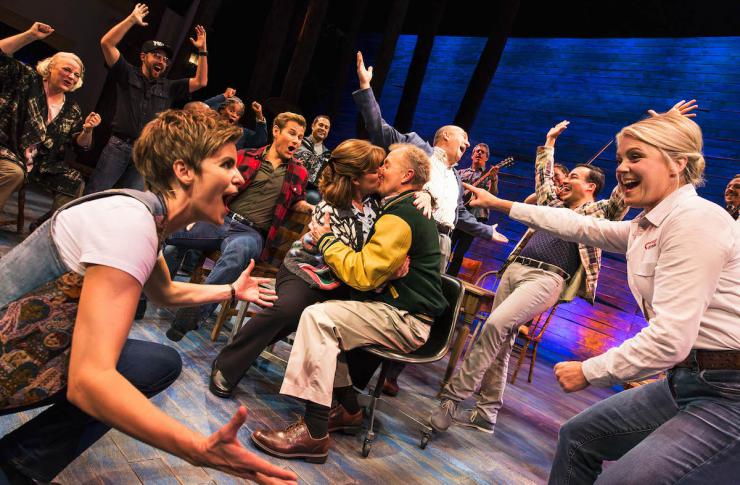
Something of the same phenomenon occurred with Having Our Say, a 1995 play by Emily Mann based on an oral history of two sisters—Bessie Delaney, who at the time of the play was age 104, and Sarah Delaney, who was 106. They were reportedly still cogent, insightful, funny. Initially surprised that anybody would be interested in them, they eventually were coaxed into telling what turned out to be a fascinating tale. Members of a prominent Harlem family, they knew the greats of the Harlem Renaissance, and they themselves were pioneers, both in civil rights and in their own respective professions: Bessie Delany was one of the first black woman dentists licensed in New York. I’m sure the actresses who portrayed them on stage, Mary Alice and Gloria Foster, were terrific, but to me they simply channeled these people I would have enjoyed spending time with. The performances—the play itself—seemed incidental.
Now, this is not a precise analogy. Some of the characters in Come From Away are composites. All are what one New York critic hilariously dismissed as “implausibly pleasant.” But various interviews with the actual townspeople hint that, as Emily Mann did with the Delaney sisters, Sankoff and Hein have captured something palpably extraordinary about these people who insist they are ordinary.
One such Gander resident, Beulah Cooper, head of the Gander Legion, was quoted recently as saying she didn't understand what the fuss was all about; anybody would have done what they did. “When I die,” she said, “I’m going to tell them to put on my tombstone, ‘I brought a tray of sandwiches to the Legion.’”
Jonathan Mandell’s New Crit piece usually appears the first Thursday of each month. See his previous pieces here.

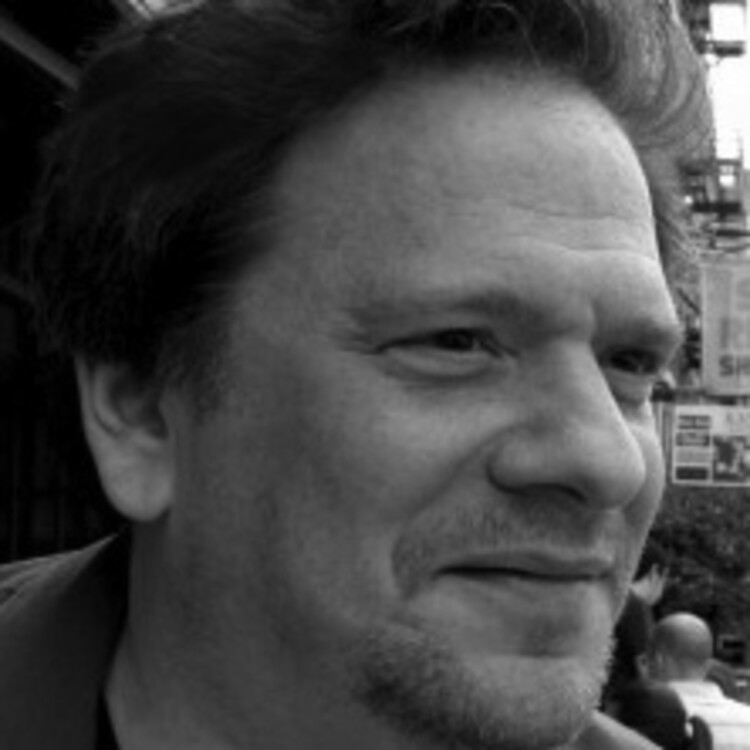
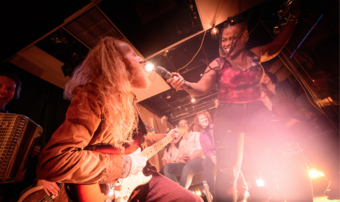

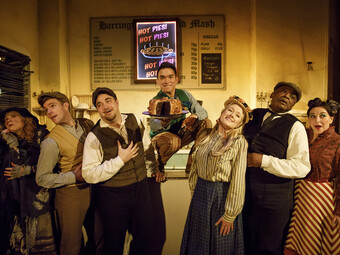

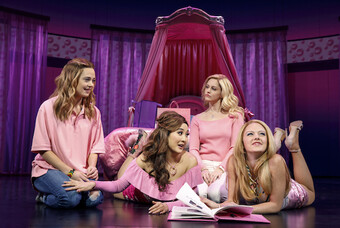

Comments
The article is just the start of the conversation—we want to know what you think about this subject, too! HowlRound is a space for knowledge-sharing, and we welcome spirited, thoughtful, and on-topic dialogue. Find our full comments policy here
Well, you removed my comment wondering why you seem incapable of not returning to Trump and your need to defend your own bitterness when discussing an innocuous play. Why are you guys so prone to censorship?
My understanding is that the editors deleted your previous comment, because it attacked me personally, a violation of their comments policy.
You seem to be objecting to my expressing my personal reaction to Come From Away. But that's part of a critic's job.
I suppose if I squint very hard I could see how wondering why a reviewer talked more about politics than the play itself could be construed as a "personal attack". Such is our world now.
There are many characters. You name none. You spend two lines discussing the music in this *musical*. It's Celtic and I guess not good. Why are you spending more time talking about Trump and Trudeau than the songs in an apolitical play? A play that goes to great lengths to avoid the politics of 911, for God's sake?
If a reader came to this review to learn about the play, they would learn more about you and your politics. This is not your job.
Or is it?
1. In the body of this piece, I link to a review I did in DC Theatre Scene that goes into some depth about the show. Here's another link to that piece, for your convenience -- https://dctheatrescene.com/...
2.This essay in HowlRound is not an opening night review, the way the one in DC Theatre Scene was. I explain the point of this "NewCrit" piece in the first paragraph. I'll repeat for your convenience: "Our reaction to any show is no doubt influenced by what we bring into the theatre with us, but once in a while a show owes its collective appeal to the world and the times more than any lyrics or lines." That's why I talk about Trudeau and Trump in this essay about the show.
3. You clearly have a different view of Come From Away than I do. I don't believe, as you do, that the show is "apolitical" or "innocuous."I'm not sure you can set a show during September 11th, 2001 without the show being inherently political -- even "avoiding the politics of 9/11" is both an aesthetic AND political choice -- but I don't think they completely avoid politics; it's certainly political, for example, that we're shown the hostility and suspicion towards a Muslim passenger. In any case, one of the points of the essay is that it's the theatergoers who are reacting to the show "politically," whether or not the theater makers intended it to be taken that way.
4. "It's Celtic and I guess not good," you write, summing up/satirizing my view. I write: "I enjoyed the foot-stomping Celtic-flavored music."
Fair enough. This is a political essay, then. About an apolitical play. You do you, I suppose.
I of course don't agree with your assessment, for reasons I just explained. But feel free to label it any way you wish. You do seem in personal attack mode, with that gratuitous "You do you, I suppose"...and I don't even have to squint.
Come From Away...
Thank you for your article. I think you brought up some very interesting perspectives. I agree with your assessment of the quality of the book of the show, as well with the Wall St Journals, its deeply flawed and very pedestrian at times. But what I find fascinating is that I think it's those flaws that are making it so successful.
Yes, the show is an oversimplified statement of "just be decent, do the decent thing." And it's what people want!
With the partisan politics in the US right now, everyone is fighting rabidly over the minutiae of every little thing said and done and inferred and tweeted. The importance of what's being debated is taking a back seat to the obsessive need to rant, from both sides of the isle. It's become an addiction to bickering for the sake of bickering and the merit of each topic subjugated in the process . Or worse, ignored completely. It's "Partisan Inc." A colossal never ending "he said/she said/but then they said" argument like some massive Means Girls feud with more dangerous consequences.
The endless arguing about anything just to to keep a foot hold anywhere.
It's ridiculous and it's a sad circus.
Come From Away IS over simplifying, but to great effect! Like the lady from the Legion who said she just carried a tray of sandwiches over to the legion. She's exactly right. Just do the bloody simple decent thing and shut up about the rest.
The more outrageous Trump tweets, the more outrageous everyone reacts. It's giving energy to the very smallness we should not be giving any energy to at all. News Media's life blood is the sensational and salacious. If we literally all just ignored it, just switched it off, Trump and all his ilk would disappear like a shadow before you even knew it.
Also, to another point, I think there's a good reason it's not set in NYC. Being set in Gander uses an important metaphorical as well as dramatugical device.
It's in a place that is far away from NYC, so they have... Perspective. Very necessary in this case.
And the perspective is: Why is everyone getting caught up in all the minutiae of everyone's personal politics? Just be decent and treat people well and screw the politics!
As in the show, no one in Gandar cares weather you're white, black, gay, straight, or Muslim. They're hungry, and they need sandwiches. Bring them to the legion. The rest is irrelivant.
Gander in this production is the rest of the world. And the Plane People the US and their many diverse politics.
It takes simple people from a very simple place like Gander to remind all the Plane People that we're all just citizens of the world in the and we all have the same needs; Food, shelter, warmth.
"Get some bloody perspective!", the show is saying. We don't care where you came from! Here's some food! I'm just going to the normal basic thing and treat you like a citizen of the world who needs help right now!
9/11 is the back drop for the crisis that is separating people and pulling apart communities. Gander is the perspective on how it could be delt with effectively, to everyone's benefits.
Forget the petty bickering. Don't even start it!
Just do the damn simple straight forward decent thing.
Bring a damn tray of sandwiches.
Oversimplified yes, but that's what everyone decent who's going to the show is screaming for, right along with the show! Oversimplify please! They're begging! Enough with the politics Just do the damn decent thing!
Thanks for your comments. It looks as if we agree on much.
You might be right that the show's appeal for many is that it's "oversimplified." That doesn't strike me as a good thing. The world is complex. Shows -- and politicians -- that try to substitute complex reality with an oversimplified make-believe are ultimately not doing us any favors.
I don't know how "simple"the people in Gander are. I suspect in real life they're as complicated as any group of human beings.
Again I agree! I don't think it is such a good thing. And yes the people of Gander are as complex and nuanced as anyone anywhere. I meant as an explanation not as a defence. But, to further explain, America does a fantastic job of impeding it citizens'complexity on just about all cultural and educational levels (except for some parts of those those pesky left and right blue coasts). America is the modern master of dumbing it down. This makes it much easier to a) control folks, and b) sell them crap they don't need. Not that this doesn't exist anywhere else in the world of course, but America has kinda perfected it while presently maintaining a reletively low body count in comparison to others' history. So, all I'm saying is, for a culture that is built on "think less but more", This is a perfect show for them. And the message it still right, and true. Take care of others. Period.
And then they can go back to their regularly regimented lives, do nothing about it, yet feel that in some way they have. ;)
"When I saw Come From Away, I was grateful that the musical didn’t wind up being “triggering,” as I wrote in my review of it for DC Theatre Scene.
But I have to admit that I couldn’t help harboring some resentment
towards the show and its admirers. Why is this first “9/11 musical” on
Broadway set 1,500 miles away from New York—or indeed very far from any
place that was attacked? Are they implying that you had to travel a
great distance to find people acting decently during the crisis? There
were many New Yorkers who behaved decently during 9/11, even though
their lives were endangered. Some of the most decent lost their lives."
Do you realize how ridiculous this sounds? So Canada shouldn't tell this story because it's . . . well . . . Canada? I don't think for one moment anyone was saying "See, we are better than New York".
Canadians are of course free to create whatever they want. I'm a New Yorker reacting to a show that's on a New York stage. If my effort to be honest about my reaction makes me sound ridiculous, I revel in it.
And I could see a fellow New Yorker coming away from this show feeling that, yes, the Canadians are saying "See, we are better than New York." Out of some three dozen characters portrayed in the musical, only two are New Yorkers. One of these New Yorkers seems primarily concerned that the rubes of Gander will steal his wallet. This strikes me as remarkably unlikely, but I suppose there could have been some New Yorker stranded in Gander who was that cynical and, well, dumb. It's a comic thread the purpose of which eventually becomes clear -- to show that he soon sheds his suspicious New York nature because of the overwhelming warmth and generosity of the Canadians.
What he's really concerned about is that when he is told to just take people's garden furniture, he's going to be shot, or otherwise dealt with harshly. That's not an unreasonable concern for a black North American. It is unreasonable in the particular context of Gander, because you're not going to get very far with anything even if you do decide to steal it. It has nothing to do with the inherent nature of the Ganderites and more to do with their isolation.
And that is the message of the show that some overly defensive New Yorkers seem to be missing. No one is saying that Ganderites are inherently better people (especially the townspeople themselves). They just had the opportunity to be generous, and they took it. It's a remarkable story, and a lovely one. There are other 9/11 stories that can't be told just yet, because not enough time has passed. But there will be time to tell those stories. It doesn't mean we can't appreciate this one.
With all due respect, Ronmags, your take on this character, whose name is Bob, is at variance with that of the authors of Come From Away, who write the following character description of him: "Bob: A hardened New Yorker, Bob is suspicious of where he’s landed, fearing that it’s World War 3, that someone is going to shoot him and steal his wallet – but instead, he ends up losing his New York jadedness."
Excerpt from Bob's monologue in Scene 20:
"People are saying ‘we want you to come to our house’. And I think, what is up with this? I mean, are they charging for these “free” showers? Or are they gonna go all Norman Bates." He's invited to the mayor's house...."His wife shows me where my bedroom is and where the shower is and through it all, I keep thinking – where am I going to leave my wallet? Someone is gonna steal my wallet."
It's not until Scene 25 that the mayor of Appleton says to Bob:
DERM: ...do me a favor and start to round up some grills.
BOB Round up some grills?
DERM: Yeah, just go to people’s yards and take their grills.
BOB:...Take their grills? Someone’s gonna shoot me.
Finally, in Scene 29, he says:
"I’m not worried about my wallet. I’m not worried about getting shot. I am a little worried about how much Irish Whiskey I’m drinking..."
It is clear to me that this business of Bob being scared of the Ganderites is, as I said, a "comic thread" -- not intended to be either realistic or reasonable.
Now, it's true that Bob is one of the characters portrayed by Rodney Hicks, who is an excellent actor (whom I saw previously in The Scottsboro Boys) and who, yes, is African-American. But I don't recall a single moment in the script in which the character is identified by his race. My interpretation, based on the authors' own words, is at least as valid as yours.
So now that I've addressed your first point, let me comment on your "overly defensive New Yorkers seem to be missing." sentence. First, my comment about Canadian superiority was a direct response to SDrick's snarky put-down of my honest reaction to the show. I said "I could see a fellow New Yorker" coming away from Come From Away feeling as if the Canadian authors were saying Canadians were superior. I personally didn't feel that way. I felt that Bob was just one of their (many) stock characters -- the cynical, neurotic New Yorker.
I'm starting to find it kind of hilarious that theatergoers who appreciate this feel-good musical are engaging in feel-bad name-calling because someone has a slightly different take on the show.
And, relatively speaking, it IS just slightly different, as I hope a careful reading of either of my pieces would make clear. I think I understand why people are drawn to this show. As I write in the penultimate paragraph above, the creative team "captured something palpably extraordinary about these people who insist they are ordinary."
Bob's being scared of the Ganderites is exaggerated for comic effect, yes. That doesn't mean there's not truth behind it. And I would argue that even if the script doesn't specifically mention that Bob is supposed to be African-American, there are nuances with an African-American character fearing to be shot that wouldn't be there with a white actor.
And I was referring to the hypothetical New Yorkers you mention in your comment by saying that they are "overly defensive". I would also include Jesse Green, the critic for New York magazine and future New York Times critic, in this number, as he has made very similar points. I would suggest that is no more name-calling than calling the Ganderites "rubes."
1. In your first comment, you said "What he's really concerned about is" -- but I used evidence to demonstrate that's not the intention of the authors. They are showing Bob as a neurotic New Yorker who's afraid of many things, such as being murdered in the shower by a Norman Bates type, that are comic not realistic fears. Why focus exclusively on his fear of being shot when that's one in a long line of his neurotic fears?
Now, you're certainly within your rights to an interpretation of the character that's at variance with the authors' intention. That indeed is something I talk about in the very first paragraph of the piece -- that one's reaction to a show is in part based on what we bring into the theatre to begin with. That was why I was careful to say to you "My interpretation, based on the authors' own words, is at least as valid as yours." -- not that yours was invalid.
So, why can't you afford me and the hypothetical New Yorker and Jesse Green the same courtesy?
That brings me to:
2. To repeat: I find the Ganderites -- the ones I've read about, and the ones depicted on stage -- to be extraordinary. They are "rubes" in the eyes of the jaded New Yorker character; this is the authors' shtick, not my name-calling.
If you look at all the comments in this thread, you'll see others who seem to take offense at my views toward the show (and the views of another commenter, Jose Carrasquillo) and go on the offensive. I wasn't singling you out. However, I can't agree with you that it isn't name-calling to label a hypothetical New Yorker and Jesse Green "overly defensive" for having a view different from your own about a musical on Broadway. Dictionary definition of defensive: "Self-justifying, oversensitive, prickly, paranoid, neurotic;" Wow, again with the neurotic New Yorker stereotype? And that's even without the "overly."
You, hypothetical New Yorkers and Jesse Green are of course entitled to your views on the character and the show, as I am entitled to mine (I disagree that my interpretation is at odds with the authors' intentions, but you are perfectly entitled to think so). But one of the reasons why comments are permitted is so that people can provide their differing interpretations on such subjects.
My issue is not with differing opinions about the show - everyone can have those. My issue is with hypothetical New Yorkers' and Jesse Green's view that the show shouldn't have been made at all, because it deals with a tangential aspect of 9/11 and not the main events of that terrible day. If someone wants to write another show that is more directly related, then they are most welcome to do that. But I don't think it's a valid point of view to say that this story (which really happened) shouldn't be told. And yes, I think it's defensive.
After this last comment of yours, I read Jesse Green's review of Come From Away. Nowhere do I find him saying that Come From Away shouldn't have been made at all. He's way harsher about the show than I am, but he does talk about "its fine qualities, which are sufficient to position Come From Away as a possible feel-good hit."
I certainly don't say that it shouldn't have been made at all -- and, since I apparently created the hypothetical New Yorkers of which you speak, I can say with authority that they don't say that either.
Yes, he, I and they have some problems with the show. As Green puts it: "even openhearted locals may rankle at the glibness" of some of it. To call any New Yorker who feels this way "defensive" is to make an ad hominem attack. You are "entitled" to make such an attack, just as you're "entitled" to deny the evidence that I laid out at some length to show you how the authors intended the character of Bob. But then there's no real point in further conversation about this, is there?
For me, the contentious statement in Green's review was, "perhaps New Yorkers may be permitted a bit of side-eye about a work that borrows our local tragedy as background for 100 minutes of Canadian civic boosterism." It seems to me that there is no other interpretation of that statement other than implying that the show should not have been made, but opinions may differ.
He says "New Yorkers," not theatergoers. So it's probably more accurate to wonder whether he's saying it should not have come to New York, rather than that it should not have been made at all.
Maybe that's a good question: Should Come From Away have come to New York?
From a business point of view, the obvious answer is: Yes, it's a hit.
Some New Yorkers (again, hypothetical) might answer differently.
Funny, I resented this work not because it came from away, but because of its shallow, vintage Disney-like portrayal of people during tragic circumstances complete with homophobic jokes and broad strokes assumptions about race and cultures. Critics suggesting that Come From Away is somehow a musical for our complex political times should actually expand their horizons and read 1984, The Handmaid's Tale and Blindness for a start. Come From Away has self-important aspirations, but in the end, all it manages to be is pablum for those with a need to believe that humans are fundamentally good.
The "homophobic jokes" to which Mr. Carrasquillo surely refers is something I wrote about in my review for DC Theatre Scene, recounting a scene in a bar: "A gay couple, both named Kevin, (Chad Kimball and Caesar Samayoa), are cautious about their relationship in what might be redneck territory, but when they let it slip, they discover half the denizens seem to have relatives who are gay. Not a single one of the locals in the bar are themselves gay, and when one of the Kevins jokes “There must be something in the water,” one of the locals answers “That’s why I only drink the beer.” It’s a funny line, and an example of Sankoff and Hein’s general approach — even when they seem to be taking risks, they keep it safe and light."
I think you're wrong, Jose, and I think you miss the point. I certainly don't feel any "need" to believe that humans are decent. I actually don't think people are decent at all - that's why we're in the terrible world that we are. But I loved the show. It's a snapshot, entirely of a time and a place. The fact that many - including yourself - are reading more into it is because we can and want to. But don't. It is what it is - and what it is, is a feel-good piece, much like most feel-good pieces, with broadly drawn characters (that are based on real people - see some of the interviews), and a message of tolerance. Not deep or complex enough for you? Well, don't look for it in contemporary musical theatre - 1984, The Handmaid's Tale, etc might be a better fit for you.
Personally, I'll take it. It's smart, well directed, beautifully staged, and the audiences seem to love it. It's the single most interesting piece of musical theatre on Broadway, in any case. And if I come out feeling good, or just feeling SOMETHING, well, isn't that why we go to the theatre in the first place?
Yes, many people like what you call this feel-good musical, but "the single most interesting piece of musical theatre on Broadway"? More interesting than Hamilton; Natasha, Pierre and the Great Comet of 1812; Dear Evan Hansen?
Yes, fair point on Hamilton; perhaps on Great Comet, too. But Dear Evan Hansen? It's a good show, but entirely conventional; directed well - but by the numbers; and not terribly memorable overall, other than for the performances, in my humble opinion.
Chacun a son gout, as the French say. But your response makes me curious as to whether when you call Come From Away "the single most interesting piece of musical theatre on Broadway," you're praising that particular show to the rafters, or, instead, obliquely knocking the state of musical theater on Broadway.
No, I think - as you rightly point out, with the three shows that you mention, among others - the state of musical theatre on Broadway is generally pretty good, at least this year.
I think Come From Away is special for several reasons: it tells a story in a context that audiences don't expect, in a way that they don't expect. It is entirely an ensemble piece, relying on no single actor, or any star turns; it requires the audience's imagination in a way that no other show on Broadway does; it is seamlessly choreographed, to the point that it's hard to figure out how they actually go from A to B as characters C and D; the band and sound is entirely different to anything else on Broadway right now; and, although it has some competitors, I would argue that it elicits an emotional response like no other.
I praise it not because it is the greatest musical ever written, but because it does something different on Broadway. It is beautiful and clever, peculiar to its medium, while remaining emotionally resonant. That's why audiences go nuts - and that's why I love theatre.
Mr. Mandell, you can take offense to Joe if you like, but the "state of musical theatre on Broadway" is just fine. I just don't think it is necessarily the standard to which we should all aspire.
I admit I don't like hyperbole in reviews like "single most" . . . Let's let the show stand on it's own merits. Each show touches people in different ways: Hamilton is a unique experience but I was "resentful" of the price gouging, and Dear Evan Hansen, a lovely show, has it's detractors as well, I found Great Comet to be empty spectacle and overwrought, with a singular impressive performance by Josh Groban (whom I have never really gravitated to before this). But, that's my opinion. I found Come From Away especially moving and unique with stellar performances by relatively unknown performers in a cohesive ensemble. I think self-important is a ridiculous evaluation and cynical, dismissive of the artists, but whatever. I think Broadway is always "self important" in and off itself, in it's own way, let alone the Tony Awards, but whatever. There is a lot of good work being done across the country in the regionals and I, for one, am glad that I get to witness many of these productions in a given year. And since I am emphasizing opinion, my opinion is that Jose Carrasquillo should get over himself.